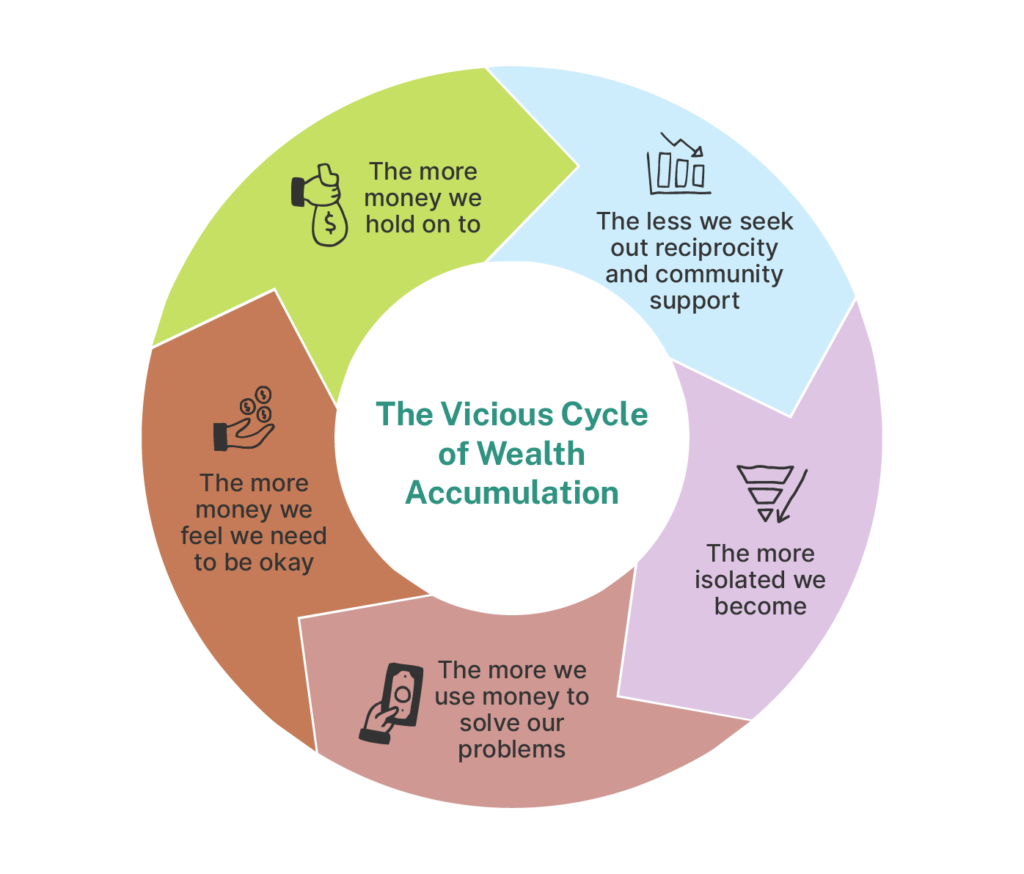Money is one of the most powerful forces in the modern world. It drives economies, influences decisions, and often defines success in societal terms.
Yet, for many, no matter how much they accumulate, there is an enduring sense of dissatisfaction, an inexplicable void that money cannot fill.
Why does this happen? To understand, we need to look beyond material possessions and delve into the timeless wisdom of non-dualistic spiritual teachings, where the answers to human fulfillment lie.
The Illusion of Fulfillment Through Money
In our materialistic society, money is often equated with happiness, security, and success. However, spiritual wisdom has long warned against this illusion.
The Upanishads, ancient Indian texts central to Vedanta philosophy, emphasize that material wealth is fleeting and incapable of addressing the innate longing for completeness in human beings.
Key Point
According to the Brihadaranyaka Upanishad, “He who desires wealth alone is never fulfilled.” The text reminds us that the pursuit of external possessions cannot satisfy the inner yearning for self-realization or eternal peace.
While money can provide temporary pleasure by fulfilling desires, it cannot address the deeper existential questions: Who am I? Why am I here? What is the purpose of life?
The endless pursuit of wealth often distracts individuals from finding answers to these questions, leaving them trapped in an unending cycle of dissatisfaction.
The Root of Dissatisfaction: The Ego & Desire

At the heart of dissatisfaction lies the ego. The ego convinces us that our sense of worth depends on external achievements and possessions.
This creates a mindset of “lack,” where the individual feels incomplete without accumulating more—be it wealth, status, or recognition.
Bhagavad Gita on Desire
In the Bhagavad Gita (Chapter 2, Verse 70), Krishna says:
“As rivers flow into the ocean but cannot fill it, so does desire flow into the mind of the wise, yet they remain undisturbed.”
This verse encapsulates a profound truth: desires are endless. Just as the ocean cannot be filled, the mind dominated by desire can never find peace.
Money, then, becomes an external tool to chase this elusive fulfillment, but it fails because true contentment comes from within.
What Truly Satisfies: Insights from Non-Dualistic Teachings

The non-dualistic (Advaita Vedanta) perspective reveals that true satisfaction arises not from acquiring more but from recognizing one’s inherent completeness.
According to Advaita, the self (Atman) is infinite, eternal, and already complete. The idea that one is “lacking” or “incomplete” is an illusion created by ignorance (avidya).
Key Teachings
- Money is Limited, the Self is Infinite:
External possessions, including wealth, are finite. The human longing for infinity cannot be fulfilled by something that is inherently limited. - Happiness Lies Within:
As the Taittiriya Upanishad states, “The source of bliss is the Self.” Real happiness arises when one turns inward, recognizing their divine essence rather than seeking it in fleeting material objects. - Contentment (Santosha):
Spiritual teachings emphasize the value of contentment, a state of being where one is satisfied with what they have. Contentment doesn’t mean stagnation but the recognition that external achievements don’t define one’s worth.
The Vicious Cycle of Wealth & Desire

Image source: Iris Brilliant on Medium
Money provides temporary pleasures, often mistaken for happiness. Yet, these pleasures are fleeting, requiring constant reinforcement through new acquisitions. This leads to a cycle:
- Desire → 2. Accumulation → 3. Temporary Fulfillment → 4. Dissatisfaction → 5. New Desire
This cycle perpetuates the idea of “lack,” keeping individuals trapped in a perpetual chase. Vedantic teachings describe this as samsara, the cycle of birth, death, and rebirth, fueled by unfulfilled desires.
Shifting Focus: How to Cultivate True Satisfaction

To break free from the cycle of dissatisfaction, spiritual teachings suggest shifting focus from external accumulation to internal exploration. Here are steps inspired by Vedantic philosophy:
1. Practice Nishkama Karma (Selfless Action)
Perform actions without attachment to results. The Bhagavad Gita teaches that true joy comes from dedicating actions to a higher purpose, rather than seeking personal gain.
2. Mindfulness & Awareness
Be conscious of the motivations behind desires. Ask yourself: Will this truly make me happy, or is it a temporary escape from inner discomfort?
3. Detach from Materialism
Detachment doesn’t mean renunciation of wealth but understanding its limitations. Wealth should be seen as a tool, not the ultimate goal.
4. Discover Your True Self
Dedicate time to meditation, self-inquiry, and spiritual study. The Upanishads urge individuals to seek knowledge of the Self, for this alone leads to eternal peace.
5. Cultivate Gratitude & Contentment
Recognize the abundance already present in your life. Gratitude shifts focus from lack to abundance, fostering a sense of satisfaction.
Why Money Alone Can Never Be Enough
Scientific Perspective
Studies in psychology support the idea that beyond a certain threshold, additional wealth doesn’t significantly improve happiness. For example, a 2010 study by Princeton University revealed that emotional well-being plateaus after an annual income of $75,000. More money beyond this point has negligible impact on happiness.
Spiritual Perspective
Vedantic teachings go further to state that money doesn’t address the core issue of human dissatisfaction: ignorance of one’s true nature. Until one realizes the Self, no external possession can bring lasting peace.
The Role of Money in a Spiritual Life
Money, while not a source of ultimate fulfillment, is not inherently negative. It can be a means to live a meaningful life when used wisely:
- Supporting causes aligned with higher values.
- Providing for loved ones without attachment.
- Investing in personal growth and spiritual education.
As the Isha Upanishad beautifully states:
“Enjoy wealth with detachment, for the universe belongs to the Creator, not to the individual.”
Conclusion: Recognizing True Wealth

True wealth lies in recognizing your inherent completeness and living in alignment with your higher purpose.
Money can serve as a tool, but it is not the destination. The spiritual journey is about dissolving the ego, breaking free from desires, and realizing that you already possess everything you need within yourself.
To live a truly fulfilled life, one must shift focus from external accumulation to inner exploration, embracing the eternal truth: You are not lacking; you are already complete.

